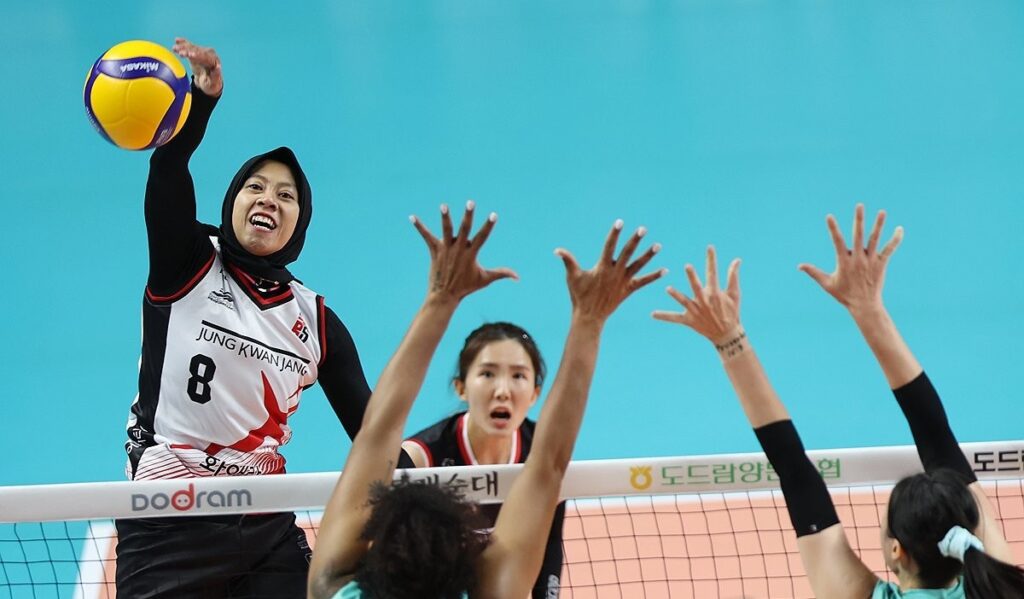
Jung Kwan-jang Mega scores 20 points for second consecutive game as Hyundai Construction Wipawido pulsates
“It’s a big help to our power”, says team commander
Megawattie passes the ball
Jung Kwan-jang plays against GS Caltex in the women’s GS Caltex Dodram 2023-2024 V League on Tuesday at Jangchung Gymnasium in Jung-gu, Seoul. Jeong Kwanjang’s Megawatti is doing a spike.
The Asian quota system, which was introduced this season, is having a major impact on the women’s professional volleyball standings.
The Asian quota players, selected by their respective teams, have been filling the gaps in their teams’ lineups with starter-level performances.
Hyundai E&C’s wing attacker Wipawee Sittong (Thai: Wipai) has established herself as one of the team’s mainstays with a tremendous amount of resilience despite her small stature (174 centimeters).
He scored 21 points, the second-most on the team, in the team’s win over IBK on Nov. 21.
The only other player to score more points than Wipawi on the day was foreign player Moma Basoko Leticia (real name Moma).
Jungkwanjang’s Megawati Putih
(Indonesia-registered name Mega) is the team’s ace in the hole.
He has scored 20+ points in two consecutive games since the start.
There are other teams that have managed to stave off a power shortage with Asian quarterbacks.
IBK added Ponpun Gedpard (Thai: Ponpun) to alleviate their setter woes, while Pepper
Savings Bank added middle blocker MJ Phillips (Filipino: Phillips) to improve their height weakness.
Hyundai E&C’s versatile Wipawi.
The addition of the Asian quartet has also narrowed the gap between the teams.
Pepper Savings Bank, which lost 31 of 36 games last season, is in fifth place with one win and two losses in three games this season.
IBK has been on a three-game losing streak since the start of the season, but has played
evenly in its last two matches, taking one set each against powerhouses Hyundai E&C and GS Caltex.
The managers of the teams on the field agree that the inclusion of the Asian quarterfinalists has given them more breathing room.
“We were worried about Wipawi’s height when we selected him, but he has better
jumping and serving ability than we expected, so he is a great addition to the team,”
said Hyundai E&C head coach Kang Sung-hyung ahead of the team’s home match
against Korea Expressway Corporation at Suwon Gymnasium on Nov. 25.
“I think there are teams that have benefited greatly from the Asia Quarter players,” said
Korea Expressway Corporation head coach Kim Jong-min. “Our Asia Quarter player,
Tanacha Suksot (registered name Tanacha-Thailand), is an apogee spiker, and we need
to organize traffic (with other players), but I think we can improve our teamwork by the middle of the second round.”
Some say that the introduction of the Asian quota is bursting the professional volleyball bubble.
The salaries of the players in the Asia Quarter are capped at $100,000 (about $135,000),
which is less than the average salary in the women’s division ($152,000).
In many cases, it is more efficient for a club to utilize an Asia Quarter player than to
overuse a domestic player who earns hundreds of millions of won.
Some clubs are calling for an increase in the number of Asian quota players.
On the other hand, there are those who believe that the domestic player base will be
greatly diminished by the use of Asian quota players.
In fact, many of the players who were mainstays of the national team up until last
season have seen their playing time significantly reduced.
It is argued that Asian quota players could have a negative impact on the domestic volleyball ecosystem. 슬롯사이트